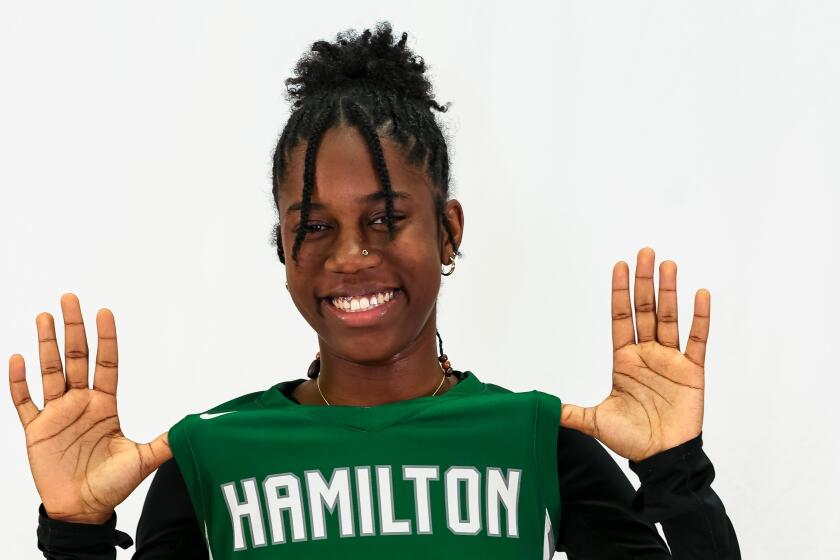NFL retirement very different for Fred ‘Curly’ Morrison and the late Joe ‘The Jet’ Perry
Injunctions were filed, lawyers plotted, NFL owners spun the story their way and NFL players countered with theirs.
Those were the big headlines last week. That was the news.
But it wasn’t all of it.
Joe “The Jet” Perry died and Fred “Curly” Morrison got a little sadder.
They had lots in common.
Perry was 84 when he died Monday in Tempe, Ariz. Morrison is 84 and lives in Murrieta. Both were star pro running backs in the 1950s, Perry mostly for the 49ers and Morrison first for the Bears and then for the Browns, with whom he won two NFL titles in the Otto Graham era. Perry came from Los Angeles and Morrison from Columbus, Ohio. They played in the leather helmet era. You ask Morrison now about face masks and he giggles. He broke his nose so many times that he couldn’t breathe out of it until he was 50, when he had surgery.
When he heard about Perry’s death, Morrison says he felt terrible, as he does often these days at similar news.
“He was one of those guys,” Morrison says, “who you could walk up to after a hard game and have a nice chat. The nickname ‘The Jet’ was perfect. I learned a lot from him, like how to be explosive.”
Perry and Morrison also had one big difference.
Perry played for 16 seasons in the NFL. According to his wife, Donna, he died of complications from dementia. He had it for about 10 years and, she said, it was traceable to his football career.
Morrison played seven seasons, then quit because he had a chance to take a better-paying job in television.
“It was hard,” he says now. “I could have played a couple more years, at least. But we had three kids in school and the job was going to give us more. It was a hard decision.”
Also the best one he ever made.
“Yup,” Morrison acknowledges now. “When I heard about Joe, it wasn’t the first thing I thought about, but after awhile, I thought about it a little.”
The key difference between Perry’s career and Morrison’s was nine years of damage, nine years of shots to the head. There is limited definitive medical proof. There is increasingly overwhelming anecdotal evidence.
Unlike so many of his aging NFL brethren, Morrison is articulate, bright, totally intact. A lunch with him is a sumptuous two hours of insight and stories. Even the curly hair that prompted the nickname is still there, just white now.
Morrison did not escape damage. Besides the oft-broken nose, he had two back surgeries, both knees replaced and can’t sit for more than an hour without his right leg shaking uncontrollably.
Yet he is not among the fist-clenched-in-anger faction of NFL retirees, those who not only have been left to live a life of pain, but feel the NFL and the NFL players’ union has turned their backs on them and their need for better pensions and medical benefits. Morrison is more from the Rodney King school. He just wants everybody to get along.
“I’ve had a wonderful life,” he says. “I’ll be forever grateful for what the NFL did for me.”
But Morrison also knows he’s one of the lucky ones, that a career after football in the broadcasting industry, both as a commentator and a marketing executive, left him better off than many of his playing peers.
“My back surgeries were $80,000,” he says, “but I had my own insurance.”
He says he went to a Browns reunion and was playing cards with a former teammate — “somebody you’d know, but I won’t name him because I won’t embarrass him” — and says he learned that the player had, in short order, lost his wife, moved in with his daughter and sold his NFL championship ring for $5,000.
“It tore me up,” Morrison says.
He says he spends so much time worrying about his old football friends that his wife frequently asks him what is wrong.
Morrison talks about Dick “Night Train” Lane dying in a wheelchair in a nursing home. He says his late teammate Bulldog Turner walked around for years with an oxygen tank.
He struggles with his good fortune when he sees so many he cares about having the opposite. He talks about better helmets — “tighter and closer to the head” — and sees progress in some of the benefits the league has recently brought forth.
And he remains mystified at how the current NFL players seem totally uninterested in the forerunners of the game and their current sorry state of health.
“It seems like, now, it is all me, me, me,” he says.
Should they not look at the old guys, then look in the mirror, project themselves out 30 years and start negotiating for their league’s history and their own future health?
As former NFL star defensive back Ronnie Lott, 52 next Sunday,said recently, “I know what is coming.”
The weeks ahead will bring more stories and bigger headlines about injunctions and lockouts and courtroom maneuvers. The cold battle of billionaires versus millionaires will march on.
At the same time, maybe another old player will pass on. Maybe the cause of death, like Perry’s, will be a straight line to the NFL. Maybe it will be somebody famous enough to get the attention of both the NFL and the current players, and maybe it will jar both sides into seeing that pioneers should be cherished, not ignored.
That would have the human element trumping the dollar bill. It would put gratitude before greed.
It also won’t happen.
More to Read
Go beyond the scoreboard
Get the latest on L.A.'s teams in the daily Sports Report newsletter.
You may occasionally receive promotional content from the Los Angeles Times.











